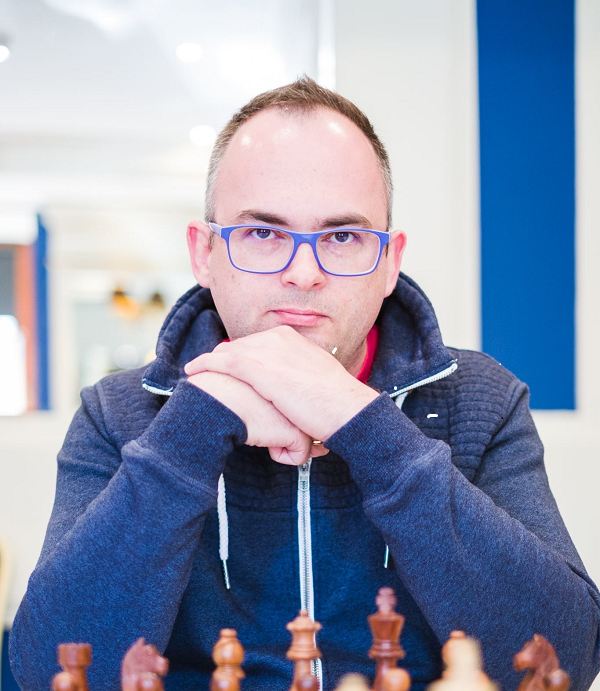INTRODUCTION
On May 21, 2018, a Reddit post by relatively unknown Polish Candidate Master (and software developer) Andrzej Krzywda, titled I Was ~ 2100 for > 20 years (I’m 38). Last Week I Made an IM Norm, sent a shockwave through the chess community and immediately became viral.
As the title suggests, after spending two decades in the 2100 levels, Andrzej managed to score the norm of an International Master with a rating performance of 2579. And with a +95 ELO gain.
The popularity of the post was not that surprising because Andrzej had done something incredible. Violated the „common principle“ that rapid chess improvement at the late stage of life is impossible. Proved that it is possible to make major leaps as an adult.
Moreover, he didn’t leap from being a beginner to being a category player. He surmounted the gap between the Candidate Master and Master level. After decades of being „stuck“.
Since so many chess players find (including the author of these lines) get „stuck“ in the 2100-2200s ELO heights, Andrzej’s result was incredibly inspiring. And it made everyone curious. There were so many questions.
How did he do it? What training methods did he implement? What ‘clicked’ in this particular tournament?
How did he decide to devote himself to chess improvement after all these years? Why exactly now? Why not earlier?
How did he organize his private life to align with his old/new chess goals? What changes did he make? How did he adjust?
And so on. And so on.
He became a sort of „chess celebrity“. But he never behaved like one. Prior to this interview, we talked a couple of times over Facebook and I can honestly say that the success didn’t spoil him. Andrzej is a very nice, humble, down-to-earth and approachable guy. Who doesn’t hold the knowledge for himself. Who is open about his methods. And who is willing to share them with the world.
He answered some of the questions above in the episode of the Perpetual Chess Podcast. He keeps answering others and talking about his path on his Facebook page (and sometimes also on his Twitter). And incredibly enough, when I contacted him about this interview, he agreed to sit in front of the „hot Chessentials mic“ and answer my questions about chess, chess improvement, the psychology behind the moves and life in general.
Because Andrzej is much more than a chess player. He is a very successful programmer, an entrepreneur and a family man. There is a lot we can learn from him, both on and off-the-board.
I hope you guys will find it useful. Or at least that Andrzej will inspire you to evaluate your own chess goals.
And to aim for more.
Note: Due to the length of the interview, we have decided to split it into three parts. In the first part of the interview, we talk about Andrzej’s chess beginnings and follow his career up to his adult years.
You can find the second part of the interview here.
And the third part of the interview here.
THE BEGINNING
Q: Hi Andrzej. Thank you so much for agreeing on this interview, it is a pleasure to have you on Chessentials.
As usual, we would like to start… at the beginning (quite shocking, I know). I couldn’t find any info whatsoever about your earliest days. Can you tell us when did you first start playing chess? Who taught you the rules of the game?
A: When I was 5, I learned how to play by watching games between my father and my older brother. Once I started beating them they were not interested in playing with me anymore 🙂
In my primary school we didn’t have a proper gym hall, so during winters, we’ve had table tennis and chess as main activities. We’ve had a “school league” with 4 divisions. I remember that moment when I finally was promoted to the first division.
Now that I think of it – the level was quite high overall.
Q: How did the story develop further? When did you first join a chess club? Who was your first coach?
A: I was 13 when I was in the chess club for the first time. That’s very late. Those were times before the Internet and I had no idea that only 20km from my place there was an active chess club (Opole, Poland). Neither my parents knew anything about that, nor my teachers, somehow.
I only learned alone until then and I bought 2 books by mail – a collection of Rubinstein games and a collection of Tarrash games. I’ve also cut chess games/diagrams from local newspapers (I had no idea there were specialized chess magazines) and glued them into my notepad.
Q: And when did you play in your first chess tournaments? Do you remember the feeling? The games? The result?
A: My first proper classic tournament was in 1993 when I was 13. My cousin joined a chess club in his city (Prudnik) and they went to this summer tournament in Rudnik in July 1993. My mom asked them to take me but I didn’t know anyone there. My first 4 rounds were 3.5/4 and one game I won in 7 moves against a 1800 player.
I think that was the game:
I was already tricky enough to create this “omg” face when I played Ne5 and my opponent smiled and grabbed the queen.
Overall at that first tournament, I got 3rd category (1600), if I remember correctly.
The Prudnik’s coach (Jan Siekaniec) noticed my level of playing and asked me to join the club. I was a member of Zarzewie Prudnik until when I was around 20 and I started my own chess club with my friends (LZS Victoria Chroscice), where I play until today.
It felt amazing, it’s like my whole life started to make sense when competitive chess appeared. My parents were very supportive, they took me to the tournaments, financed all the trips. But they never pushed me too much. I’ve seen that among my colleagues and found it crazy how the parents could “press”. It wasn’t the case for me, full support, but no pressure at all.
Q: How good were you when you were young? How did you fare in your age group in youth competitions in Poland? Did you ever play in European Youth Championship?
A:
Playing in the club exposed me to stronger players, but I quickly got into the competitive mode of trying to beat everyone locally. When I was 15 I played in Polish Championship U-16 semi-finals for the first time. I got promoted to the finals.
However, in the Polish finals, I was never at the top or anywhere close to that. My biggest success was being 1st in the semi-finals in 1997.
That was also when I’ve had a proper coach (but only 2 sessions, 3-days each). It was IM Kalinin. He taught me how to play London 😉
As for the European Youth Championship, I didn’t even come close. That was something I could only read about in the magazines. During this time, our Polish juniors (a bit older than me) were very successful Europe/World level. GM Kempinski, GM Macieja, GM Soćko, GM Blehm, GM Antoniewski, WGM Radziewicz and many others were an inspiration.
When I was close to 18 years old, other things were already important in my life. Even though I was qualified to U18 finals, I didn’t go there to play. Instead, I chose some school/party related events.
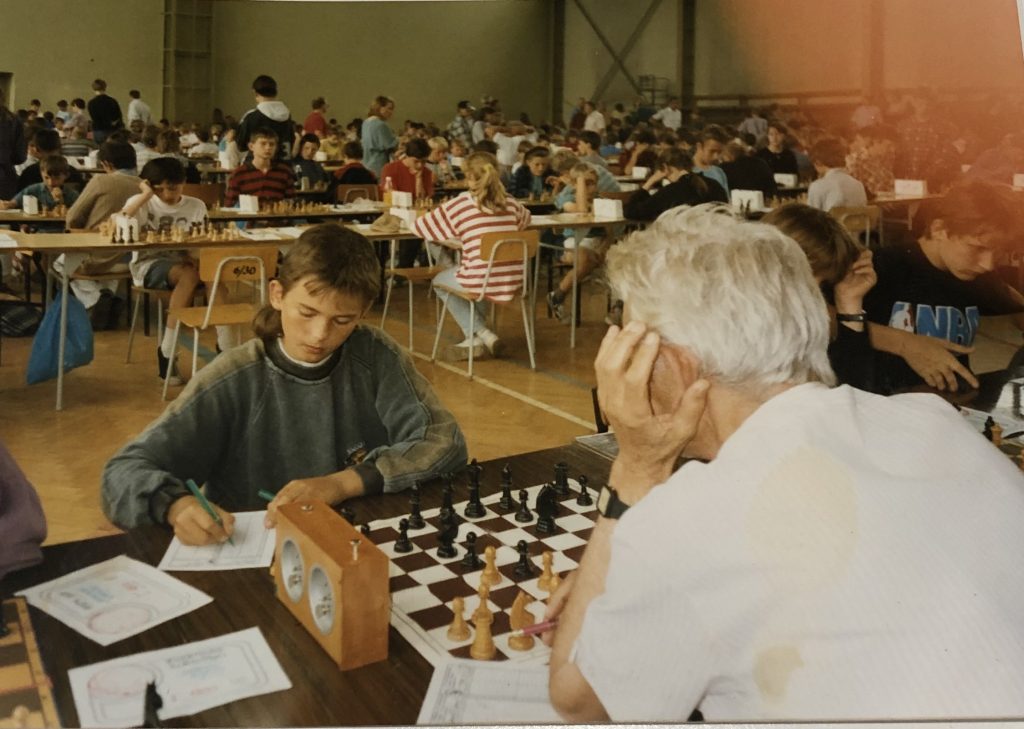
Q: What kind of kid were you? Were you calm and indifferent about the games and the results? Or were you angry and made tantrums?
A: More on the calm side. I don’t remember any situation where things went too emotional. I enjoyed competing, but never really took it very seriously.
YEARS OF „STAGNATION“
Q: Okay, let’s get away from the childhood years. In the Reddit thread, you said you were rated around 2100 for ~20 years. It would mean that the „years of stagnation“ started in your twenties.
Is it correct? When did you first feel you are struggling to improve?
A: When I started my Computer Science studies in 1998, this was hard for me. The studies were super hard and it was easy to drop off (more than 60% who started didn’t go to the second year). I focused on learning programming.
That was also a difficult time in personal life – our family (and our family business) were hugely impacted by the 1997 floods in Poland. Our situation has changed a lot and I just didn’t think about chess that much. I had to focus on earning money to support my studies and this was made a priority. I still loved chess, but it clearly wasn’t a priority as compared to studies, learning programming and working. In a way, this helped me get a good education and start my professional career in programming early on.
During this time I lived in Wrocław, which is a big city and very active in chess. I could compete with stronger masters now and that something new for me.
Q: With hindsight, what happened when you first reached 2100s heights? What did chess mean to you back then? Did you give up your ambitions due to lack of interest (hope?) or because your focus shifted on something else? Can you talk a bit about what went through 18-year-old Andrzej mind?
A: I never gave up on chess, but I think was smart enough to understand that I need something else in my life. The priorities have shifted. Even though as a junior I didn’t achieve much, I didn’t really have big expectations so it wasn’t big deal for me. There was no pressure from my parents, no pressure from a coach (as I didn’t have any). I always treated chess as something more long-term and didn’t focus on short-term goals that much.
18-year-old Andrzej was focused on finishing school, starting the studies, parties, girls, being exposed to a big city, having fun, trying to find jobs etc.
Q: But you didn’t give up your chess career completely. According to your FIDE profile, you were rated 2074 at the beginning of January 2000 (when you were 20). In the next couple of years, you continued improving (and playing tournaments relatively frequently). In 2007 you reached your first peak – 2197. And only in 2009 does the number of games per year drop significantly.
What was happening in the 2000-2007 period? Did you work on chess? Did you play any tournaments, or were those local and league matches?
A: I finished studying in 2004, took me 6 years, but working as a software developer was a big part of it and I’ve had my first successes in programming.
I think I mostly played the league once a year and occasionally some other tournaments, but often it was more for fun. I wasn’t really improving.
Things changed in 2005. I’ve had a good job, financially things were looking better and I was able to afford a coach, a local National Master – Mirosław Perdek. We attended the training together with my long-time chess friend (we met first in 1993), Rafał Zgadzaj, (who BTW is also now in the process of improving).
Early 2006 I moved to London and stayed there for 2 years. That was amazing for my chess, as I could literally play a classic game every afternoon. I worked 9-5 and then went to play every single day. The training started to pay off and I remember I’ve had a result of 18/21 games at some moment. In the team matches, I got to the first board in my teams and even played against some GMs.
That was my highest peak – I reached 2197.
BTW, that was a time, when I was switching from my usual 1.d4 to 1. e4 a process which ended in a complete switch later – I was an e4-only player from now on.
Q: In your Reddit threat you said you took a big break from chess between 26 and 35 years of age.
What changed in 2009? How come you „suddenly“ reduced your chess activity? I know it had nothing to do with children. Yet!
(Andrzej is a father of a 7-year-old and a 4-year-old – VN)
A: 2007 was the year when I moved back to Poland and started my programming company – Arkency. Again, chess was put aside and I didn’t have a coach. I tried to study chess on my own, but this didn’t work well.
You can probably spot a pattern here – when I work with a coach, my results get better. I guess I’m the kind of a player who needs this coach support.
The business part of my life became very important. My entrepreneurial DNA became visible and strong. Over the next years, this gave me a big satisfaction. I’m proud of what I have achieved in this area. I run a small (~15 people) but a strong company which is important worldwide in our programming niche (Ruby on Rails).
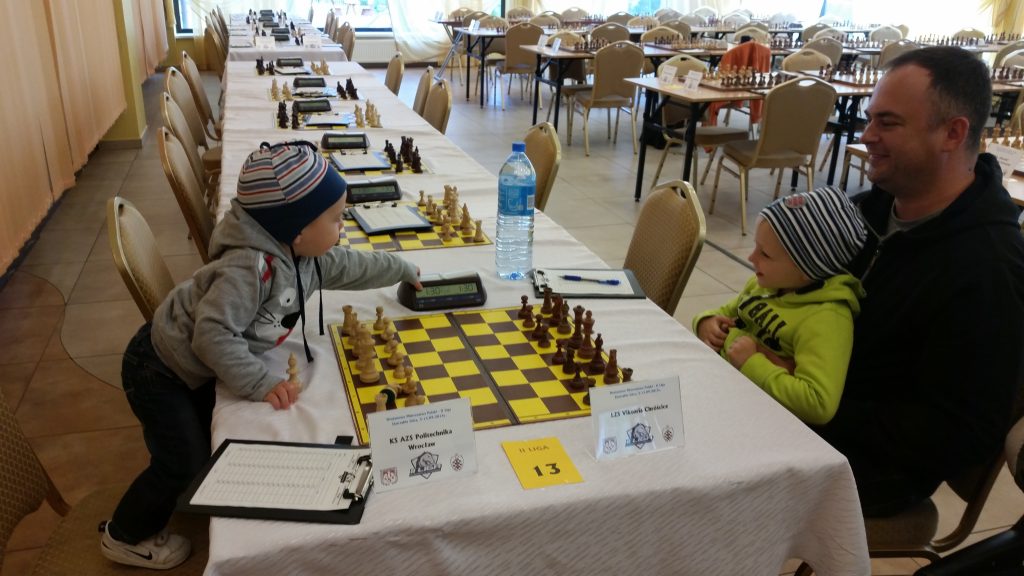
Q: Did this decision come easy? Did you regret it at a time? Did you ever feel like you were running from the fact you haven’t fulfilled your goals? From the fact you are at 2100 for quite a long time?
I ask for a friend.
A: I think I found it easy to deal with priorities. Business was more important to me. Programming was more important. I don’t regret that at all. Chess was still part of my life. I did care about getting to 2200 finally, but this didn’t work. I think I knew that chess had to wait until other things work well, especially the finances. Chess is an expensive profession and in my case, it needed to be supported by other areas (business/programming).
Q: Did you premonition you would ever return to serious chess training? Or did you think you were saying goodbye forever at the time?
A: I never said goodbye to chess. I didn’t really have a clear plan for chess at that time, but I knew it wouldn’t disappear. However, seeing that I’m getting worse and worse (rating-wise) was very frustrating. Every year I was playing in the same league (2nd Polish division). Somehow I always hoped to get a good result but it was always mediocre.
There was one specific moment of time, I think it was 2015, June, I played in that team competition and I’ve had another kind of 5/9 result and some -10 Elo. I was dangerously close to getting to <2100 level. A level which I never wanted to get to, as I wouldn’t respect myself.
(No offense to the lower-rated readers. My >2100 mindset was created before the big Fide/Elo changes. It was just my chess-bar.)
THE RESURGENCE
Q: Okay, enough about the wounds from the past. Let’s talk about the main topic – your breathtaking result and what led to it.
First of all, I would like to what led to you taking up chess seriously again. You said you started working seriously three years ago.
In the Reddit thread. you said the fact your rating dropped to 2100 again motivated you. In the Perpetual Chess Episode you mentioned you hated losing against players you „knew“ you shouldn’t lose. Anything else to add?
A: Usually I wasn’t very emotional about my chess level. But the losses were very frustrating. It’s funny because some of the losses were to players who at that time I considered weak, but now they are IMs. I was probably over-reacting a bit.
My successes in business and programming made me a stronger person overall. My success in private life (meeting my wife, having kids) has also boosted my confidence. I never really believed in the whole “chess talent” thing. I knew I was able to play better at chess and that felt like a right moment to make something about it.
I came up with this idea of a 5-year plan to get the IM. To be honest, I don’t think I really believed in this goal. But thinking big helped me in some changes.
First of all, my wife became very excited about this plan, that was so great. She comes from a chess family, she is a chess player (11 times finalist of the Polish championships). Her father is a successful chess coach – he was the first trainer for GM Jakubowski, WGM Bartel (Przezdziecka), FM Szymański. I felt the support from all the family too.
Having a clear and big goal helped me to take actions. I contacted GM Soćko and in August 2015 we started first Skype sessions.
Q: Correct me if I am wrong, but your younger child was 1 at a time. Weren’t you afraid you won’t manage to balance the paternal, the professional and chess improvement duties?
A: I was worried about it, but I also knew that I’m the kind of person who needs to have even sometimes too much on my plate, so that I can switch the contexts. When things go bad at chess, I can always remind myself of my family happiness and I’m smiling again. Or switch to my professional activities. This works for me.
Making a decision in chess was important but it was clear to me, that if my family or business would suffer because of it, I’d change the direction. It was a “let’s try it attitude”.
Q: How did your wife react? I know she is a chess player, but nevertheless… Did you ever spent a night on the couch because you were „studying that bloody Hedgehog again?“ 😀
A: She is super supportive all the time, for all the years. She understands the chess passion. We don’t really play at home together, but she totally understands why “that bloody Hedgehog” is a very important part of my life 😉
I’m terrible at calendar thinking or things like booking hotels or registering to tournaments – she does it all for me. Otherwise, I would probably forget to register, book the flights etc.
I’m not a very organized person.
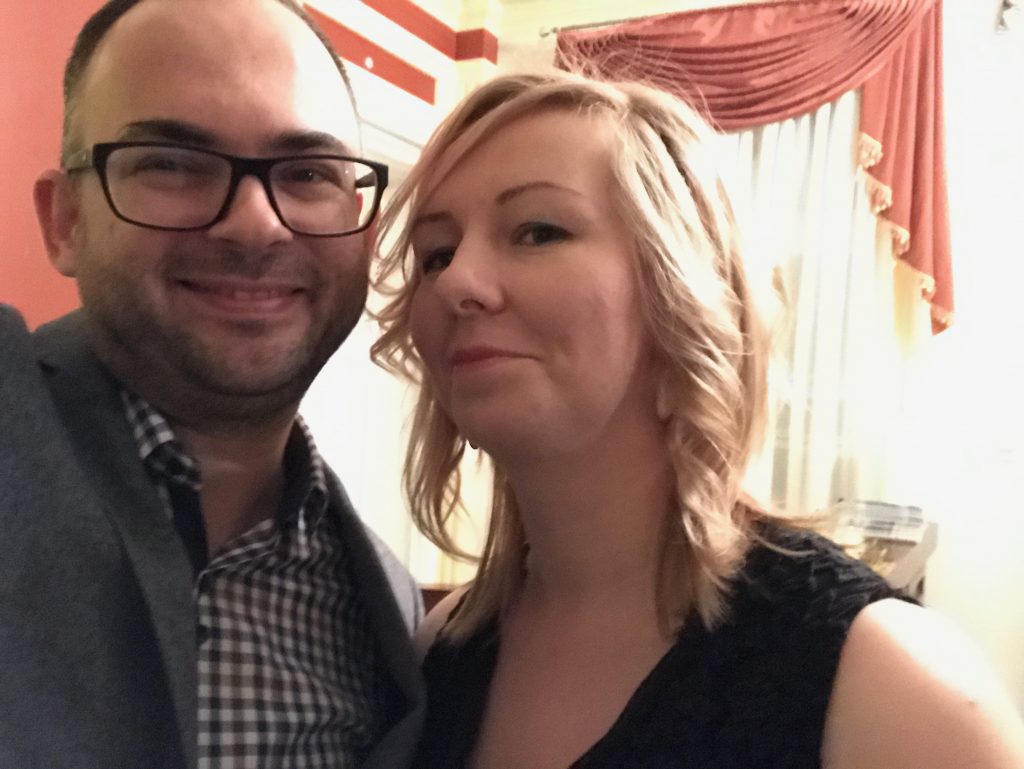
GOAL SETTING
Q: In any case, you started working on chess seriously. I’d like to talk a bit about the psychology and the training methods behind your improvement.
The first thing is – goal setting. You said your initial goal (3 years ago) was to get back to 2200. But then you realized that was your goal forever and it never really worked. So you decided you wish to go for the International Master title. Did you think it was realistic at a time? Or were you trying to „cheat yourself“ to at least break the 2200 barrier?
A: Yeah, so 2200 was my goal for like forever. The IM goal I think at the beginning was more like cheating myself, just to get the 2200 level finally. But over time I took it more seriously. That mostly changed because I learned so much from GM Soćko. He showed me a totally different side of chess. I always loved chess, but now I’m enjoying it at a totally different level. My chess perspective is so different now that it was 3 years ago. I evaluate chess positions differently.
That was a big moment for me. I knew that with this new attitude I could reach for big goals. Even though for a long time there was nothing to support my belief, I “felt” it.
Without setting a big goal, I wouldn’t even think about reaching the top chess trainer like GM Soćko.
Q: Did you have a similar approach toward goal setting in other endeavors? Do you set high or „unrealistic“ goals in your business life, for instance? Did setting the bar very high help you in the course of your programming career?
A: This attitude with bigger goals was something that grew in me, over the years in the past decade. With more confidence, I set such goals in other areas of my life. It works for me. It doesn’t have to work for others. We’re all different and motivated by different things. I’m motivated by big visions and big goals.
Q: You also made Facebook and Twitter accounts and announced your goal to the world. You even said it was crucial because it made you more accountable about it. I kinda agree that there is no sense in hiding your desires. But some people are extremely against such approach and say you should let your results speak, not your goals.
What is your opinion? Do you think you should ALWAYS announce your goals publicly? Or is it sometimes sensible to work in silence?
A: I think the FB page did help me. I wanted to share my journey, regardless if I would be successful or not. Again, this works for me, doesn’t have to work for others. At some point, I realized that what I’m doing might be inspiring to others and I was fine with it. It does bring some responsibility but I’m OK with it. I can handle this. Chess is easy to measure – you can see when I’m doing well and when not. People can decide on their own if my journey is worth watching or not.
Q: Since the chess community is rather cynical, weren’t you afraid people will laugh at you and call you delusional? Did you ever receive some snarky and mean comments through social media? Or in real life?
A: I understand enough about human psychology that I didn’t care that much about it. I quickly forget the snarky comments. I focused on my own. But to be honest, there wasn’t much about it. Quite the opposite, I think I inspired my close chess friends and people whom I never met. This feels good. Some people approached me during chess tournaments and thanked me for being public about my journey. This is really nice.
In my programming career, I’m also very public with what I think about programming – not everyone loves it, I was already used to “the haters”. I’d be surprised if I didn’t have any 😉 It’s actually fun having haters 🙂
Q: In the Q&A website Quora, one of the most frequent chess questions is: „I am X years of age and rated Y. Is it possible for me to become a Grandmaster?“, where X is a number between 30 and 40 and Y a number between 1600 and 2000.
I personally believe some goals are not realistic. No adult that took up chess that late in life became a Grandmaster in the last 50 years. The fact is that our cognitive capabilities degrade with age.
I agree that some goals are attainable (as your result has proven), but I also think there are constraints to how much one can improve (of course, I can always be wrong about everything). No matter how many hours he puts into the game.
How would you answer these questions? Do you think there are limits to how much an adult can improve?
A: I don’t think I’m qualified to answer this. It’s definitely something that I find fascinating – how far you can get if you start late.
I’m lucky in many areas of my life – I have a supportive wife, I have a great team of coworkers at my company, I have friends who support me, I can afford one of the best chess coaches in the world. This makes such goals less unreal.
Still, even having all of this support is not enough. There’s so much work that I have to put in. Things are not easy. But there’s a clear correlation, the more I work smartly, the better the results. I keep learning what works for me, what is not working. I don’t look much at others. I don’t believe much in chess talent, but if there is anything like that, then I don’t have it. That’s clear to me.
Can I become an IM? I believe so!
Can everyone become a GM, given X and Y? I have no idea, but I think there are more chances to it than many people believe. I think it’s more likely than most of us suspect. If you love chess and you are passionate about it, if you keep improving smartly, if you can afford to play chess (coach, trips), if you have relatives to support you then your chances are not so bad. The important question is, whether it’s really worth it for you? Such goals do require certain sacrifices – does it make sense for you to make them? In the end, IM or GM is “just” a sheet of paper and a record in the Fide database.
For me, it’s about the level of playing, more than the “certificate”. Still, I like measurable goals, so the actual IM title is my goal, nothing less than that.
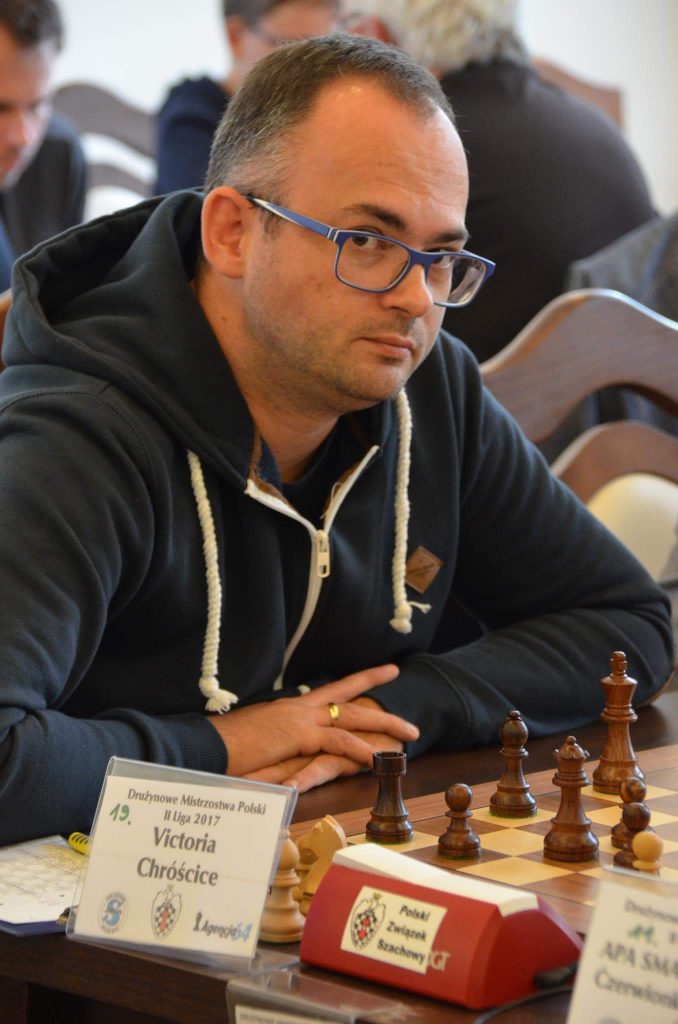
Q: What would your advice be for setting the bar (not too low, not too high?). How did you determine you want to become an IM and not, say, FM or GM?
A: It wasn’t really much thinking here. Once I realized that thinking small (2200) doesn’t work for me, I targeted for something big. FM/2300 didn’t feel big enough. GM, on the other hand, sounded too unrealistic. IM it was.
Just to be clear, I do have the goal split into levels.
My first level was to get 2200 and get the official CM title. This has happened this year and if I remember correctly that was “scheduled” for last year, in my plan. So, a slight delay.
My second goal is FM/2300 and is scheduled for 2019. I was so close to it this year (2296), but then all rating progress came back to <2200….
I don’t know if setting goals works for everyone. It works for me. You need to experiment and learn about yourself to know what works for you.
One thing I learned – there’s no magic between certain levels. Once you’re 1800, then 2000 is clearly in your reach. When you’re 2000, then 2200 is an achievable goal. If you’re 2200 then IM is realistic. If you’re an IM, GM should be possible.
I’m ~2200 now and I was close to 2300. My highest rating performance in a single tournament was 2580. That’s my potential. If I did it once, I can repeat it. It won’t be easy, though. It’s a matter of getting more precise in my chess, more hard work needs to be put, more studies need to be solved, more classical games need to be played and learned from.
There’s a finite number of chess areas you can improve on. If you get systematic and smart about it, you will see the improvements.
For me, 2200 was my mental blocker. It was in my head, that I wanted it so much, that I couldn’t reach it. Once I unblocked it with bigger goals, I almost didn’t notice that I have achieved my previous life goal – getting to 2200 at least once.
What I’m worried about now is whether my IM goal wouldn’t be a similar blocker as it was with 2200…
LINKS AND RESOURCES WHERE YOU CAN FIND OUT MORE ABOUT ANDRZEJ:
Afore-mentioned Viral Reddit Thread: I Was ~ 2100 for > 20 years (I’m 38). Last Week I Made an IM Norm
Perpetual Chess Podcast: Episode 76 – Adult Improver Series With Andrzej Krzywda
Andrzej’s Audio Clip: Hard Times – Back To 2100s After A Bad Tournament
ON 26. FEBRUARY 2019, ANDRZEJ WILL HOLD A FREE WEBINAR IN WHICH HE WILL TALK ABOUT HIS IMPROVEMENT IN GREATER DETAIL
YOU CAN JOIN HERE

